
Before the arrival of fishmeal factories in the Gambia, Musa Daboe would catch red snapper and barracuda to be sold at the local market. But his income had begun to dwindle due to depleted stocks.
Then in 2016 the Chinese-owned fishmeal plant Golden Lead began operating out of the coastal town of Gunjur, increasing demand for fish to export for overseas aquaculture.
“Now work is booming again, as we can sell our catches to both the factory and locals,” Daboe, 33, explains, taking advantage of a rare patch of shade among the brightly hand-painted canoes used by the artisanal fishermen.
“Our net catches all kinds of fish. Sometimes we meet demand with just one catch – other times we need five catches, with a catch being as big as up to 400 bowls of fish. My work is a lot more profitable and I can fully provide for my family, because the factory buys more fish than I could previously sell on the local market.”
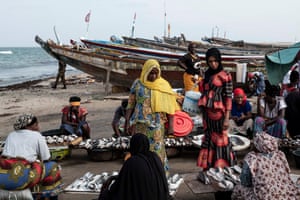
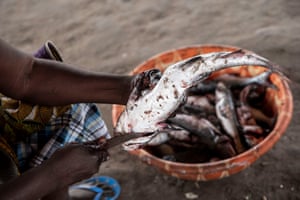
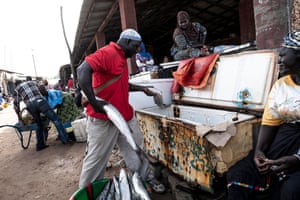
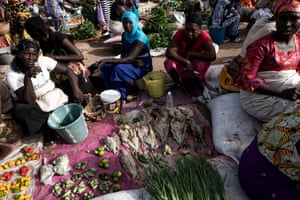
-
Tanji fish market; top right, fish trader Isatou Darboe cleans fish and prepares it for smoking in Gunjur village
While Daboe and other fishermen who predominantly supply the fishmeal plants may be enjoying short-term gains, the forecast for the Gambia’s fishing industry and the community it serves is less rosy.
Overseas business interests and attractive global prices for fishmeal are driving demand for species such as sardinella, and, as a result, are taking a crucial source of protein from the plates of the poorest Gambians while leaving large swaths of the community out of work.
The fishmeal business is wreaking havoc on the environment, local employment, food security and the tourism economy, scientists, Gambian activists and locals have warned.
On the frontline of those losses are local female fish processors who buy from the artisanal fishermen and smoke the fish, or sell it fresh at the local market. They also supply to a network of third parties who take the fish from the coast to inland markets or for export to countries such as Mali or Ivory Coast.
But with the factories taking the lion’s share of the catches, trade has plummeted for these women and others working in the supply chain.
Matilda Jobe is a 29-year-old fish seller working at the beach in Gunjur, one of the biggest fish landing sites along the Gambia’s 80km Atlantic coast.
Jobe, a widow and single mother, has been struggling to feed her young children since the opening of Golden Lead. With demand pushing up prices, the fish is too expensive, or if the catches are small, the fishmeal factories will take priority.
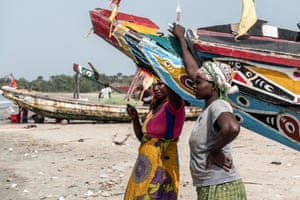
-
Fish traders Isatou Darboe (left) and Matilda Jobe wait for fishing boats to arrive, in Gunjur
“Sometimes we go empty-handed, but we keep fighting for our children,” she says. “My husband died some years ago and I need to provide for them. They need a good education so they can do better than us.”
Locals who once enjoyed fish as part of their daily diet are now struggling to afford it. Vast quantities of small fish diverted from the market for human consumption are instead being processed to feed animals and farmed fish.
Fishmeal constitutes around 68% of the feed used for farmed fish, with 5kg of fresh fish needed to make 1kg of fishmeal, according to the Coalition for Fair Fisheries Arrangements.


